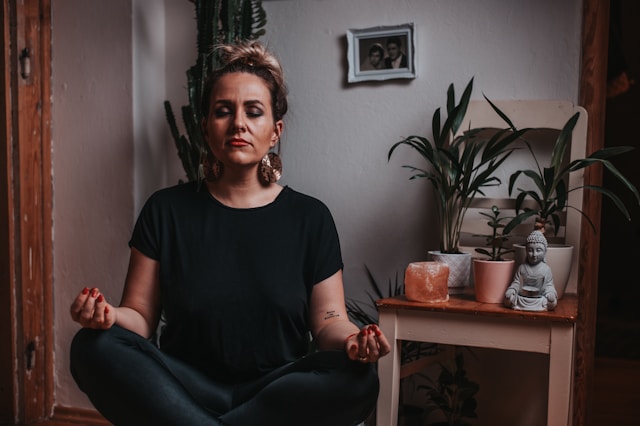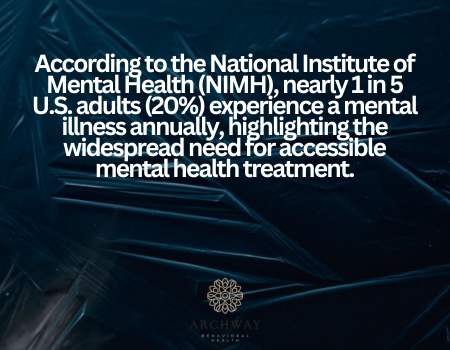Navigating mental health challenges can feel overwhelming, especially when deciding what type of care is best for your situation. Choosing the right level of care is essential for achieving meaningful recovery, and understanding your options can help you make an informed decision. From intensive programs to outpatient support, mental health treatment is designed to meet individuals at various stages of their journey.
This blog explores the different levels of care available at a mental health treatment center, how to determine what suits your needs, and the role of therapies. Mental health is a vital aspect of overall well-being, yet many people struggle to find the right mental health treatment center that suits their needs. At Archway Behavioral Health, we understand that navigating the complexities of mental health care can be overwhelming. That’s why we offer a variety of mental health treatment services tailored to meet your unique needs and help you thrive. Here’s how you can choose the right level of care for your mental health journey.
Understanding Your Needs
The first step in choosing the right level of care is understanding your specific mental health challenges and goals. Whether you’re experiencing anxiety, depression, trauma, or other mental health concerns, identifying your needs is crucial. Consider the following questions:
- Are you struggling with daily tasks?
- Do you need immediate intervention?
- Are you looking for long-term therapy or short-term solutions?
Your answers will guide you toward the appropriate level of care, whether it’s inpatient treatment, outpatient services, or a combination of both.
Why Are There Different Levels of Mental Health Care?
Mental health treatment is not one-size-fits-all. The right level of care depends on:
- Symptom Severity: Conditions range from mild to severe, requiring varying levels of support.
- Impact on Daily Life: The degree to which symptoms interfere with work, relationships, and self-care.
- Treatment Goals: Stabilization, coping skills, or long-term recovery.
- Individual Needs: Factors like family support, co-occurring disorders, and personal preferences.
Different levels of care ensure that individuals receive the appropriate intensity and type of support for their unique circumstances.
Levels of Care in Mental Health Treatment
At Archway Behavioral Health, we provide a wide range of mental health treatment services designed to meet diverse needs. These include:
1. Inpatient Hospitalization
Inpatient care is the highest level of support, designed for individuals in crisis. It provides 24/7 medical supervision and immediate interventions.
Key Features:
- Safe environment for individuals at risk of self-harm or harm to others.
- Access to psychiatrists, therapists, and medical professionals.
- Focus on stabilization and crisis management.
Who It’s For:
- Those experiencing suicidal ideation, psychosis, or severe mental health crises.
2. Residential Treatment Programs (RTC)
Residential care offers a structured environment where individuals live onsite while receiving comprehensive mental health treatment services.
Key Features:
- Intensive therapy sessions, including One-on-One Therapy and Group Therapy Programs.
- Integration of evidence-based therapies like CBT and DBT.
- A focus on long-term recovery and skill-building.
Who It’s For:
- Individuals transitioning from inpatient care.
- Those requiring immersive treatment without the need for hospitalization.
3. Partial Hospitalization Program (PHP)
A Partial Hospitalization Program (PHP) provides intensive treatment during the day, allowing individuals to return home in the evening.
Key Features:
- Structured daily therapy, including individual and group sessions.
- Psychiatric support and medication management.
- Workshops focused on emotional regulation, stress management, and coping skills.
Who It’s For:
- Those needing intensive care but with a stable home environment.
- Individuals transitioning from inpatient or residential treatment.
4. Intensive Outpatient Program (IOP)
An Intensive Outpatient Program (IOP) is a flexible option for individuals who need structured care while maintaining daily responsibilities.
Key Features:
- Therapy sessions several times a week, including One-on-One Therapy and Group Therapy Programs.
- Focus on applying skills learned in treatment to everyday life.
- Support for managing triggers and preventing relapse.
Who It’s For:
- Individuals with moderate mental health challenges.
- Those transitioning from more intensive levels of care.
5. Outpatient Therapy
Outpatient therapy offers the least intensive level of care, focusing on long-term management of mental health.
Key Features:
- Weekly or biweekly sessions tailored to individual needs.
- Emphasis on building coping strategies and addressing ongoing challenges.
- Access to therapies like CBT, DBT, and trauma-focused approaches.
Who It’s For:
- Individuals with mild to moderate symptoms.
- Those needing ongoing support after completing intensive programs.
Key Therapies Across All Levels of Care
1. Cognitive Behavioral Therapy (CBT):
CBT is an evidence-based therapy that helps individuals identify and challenge negative thought patterns contributing to mental health challenges.
How CBT Helps:
- Reframes distorted thinking to promote healthier behaviors.
- Teaches practical coping strategies for managing stress and anxiety.
- Effective for depression, anxiety, and trauma.
2. Dialectical Behavior Therapy (DBT):
DBT focuses on emotional regulation and distress tolerance, making it especially useful for individuals with intense emotions or self-harming behaviors.
Key Components of DBT:
- Mindfulness: Staying present and reducing emotional reactivity.
- Distress Tolerance: Coping with crises without self-destructive behaviors.
- Interpersonal Effectiveness: Improving communication and boundary-setting.
3. One-on-One Therapy:
Individual therapy provides personalized care, allowing clients to explore their unique challenges and goals in a private setting.
Benefits:
- Tailored treatment plans.
- Safe space for addressing sensitive topics like trauma or shame.
- Opportunity to build a strong therapeutic relationship with a licensed professional.
4. Group Therapy Programs:
Group therapy fosters connection and shared learning, offering a supportive environment for individuals to explore their experiences.
Benefits:
- Reduces feelings of isolation by connecting with others facing similar challenges.
- Encourages the exchange of coping strategies and feedback.
- Promotes accountability and social skill development.
How to Choose the Right Level of Care
Determining the appropriate level of care involves evaluating your specific needs and circumstances:
1. Assess Symptom Severity:
- Are your symptoms interfering with work, relationships, or daily functioning?
- Are you experiencing crises, such as suicidal thoughts or extreme anxiety?
2. Consider Your Support System:
- Do you have family or friends who can provide emotional or practical support?
- Is your home environment stable and conducive to recovery?
3. Set Clear Goals:
- Are you seeking immediate stabilization, long-term recovery, or skill-building?
- Do you need help managing triggers or co-occurring conditions?
4. Seek Professional Guidance:
A mental health professional can assess your needs and recommend the best level of care. Mental health treatment centers offer evaluations to guide this process.
Why Choose Archway Behavioral Health?
Behavioral health is more than just therapy—it’s about receiving the support you need to live your best life. At Archway Behavioral Health, our highly trained team of psychiatrists, psychologists, social workers, and counselors collaborates to create individualized treatment plans. Here’s what sets us apart:
- Comprehensive Care: We combine evidence-based therapies like Cognitive Behavioral Therapy and Dialectical Behavior Therapy with holistic approaches to provide well-rounded care.
- Personalized Attention: Every person who walks through our doors is treated with dignity, respect, and compassion. We listen to understand your experiences and collaborate on goals to improve your quality of life.
- Flexible Treatment Options: Whether you’re interested in one-on-one therapy or a group therapy program, we have the right options to meet your needs.
Steps to Take When Seeking Help
- Evaluate Your Symptoms: Identify the severity of your symptoms and consider how they’re affecting your daily life.
- Research Treatment Options: Look into the services provided by reputable mental health treatment centers, such as Archway Behavioral Health.
- Schedule an Assessment: Reach out to schedule a consultation to discuss your needs and determine the right treatment plan.
- Commit to the Process: Healing takes time, so be patient with yourself and stay committed to the journey.
Making the Right Choice with Archway Behavioral Health
Finding the right level of care is essential for effective mental health treatment. At Archway Behavioral Health, we’re dedicated to helping you navigate your mental health journey with expert guidance. Sign in with us and improve your mental health by getting in touch with Archway Behavioral Health. Take the step toward reclaiming your life and health—contact us at (888) 488-4103.
Frequently Asked Questions (FAQ)
What are the different levels of mental health care?
The main levels of care include inpatient hospitalization, residential treatment, Partial Hospitalization Programs (PHP), Intensive Outpatient Programs (IOP), and outpatient therapy.
How do I know which level of care is right for me?
The appropriate level of care depends on the severity of your symptoms, how they affect daily life, your support system, and your treatment goals. A mental health professional can help determine the best fit.
What is the difference between PHP and IOP?
- PHP (Partial Hospitalization Program): Offers intensive, full-day therapy sessions for individuals needing structured care while living at home.
- IOP (Intensive Outpatient Program): Provides therapy a few times a week, offering flexibility for work or personal responsibilities.
How does Individual Therapy differ from Group Therapy?
- Individual Therapy: Focuses on personalized care, addressing your unique challenges and goals.
- Group Therapy: Provides peer support and shared learning in a structured, therapeutic group setting.
What therapies are commonly used in mental health treatment?
Evidence-based therapies like Cognitive Behavioral Therapy (CBT) and Dialectical Behavior Therapy (DBT) are commonly used to help individuals develop coping strategies and manage emotional challenges.
Can I combine different levels of care?
Yes, treatment plans often involve transitioning between levels of care, such as moving from PHP to IOP or combining individual and group therapy for comprehensive support.



